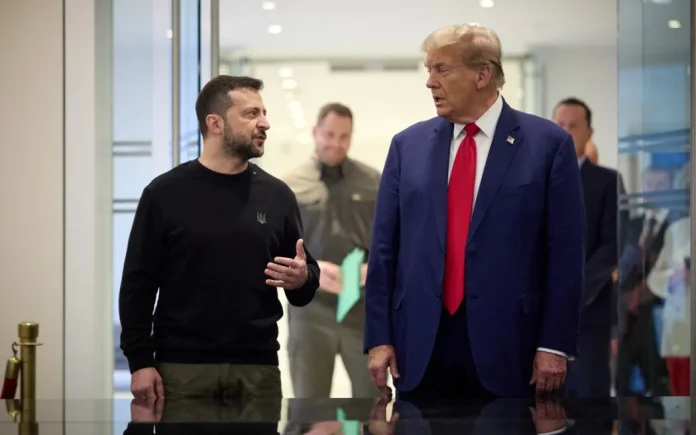
The Russia-Ukraine war has already altered the global geopolitical landscape, but a new controversy has erupted with former U.S. President Donald Trump labeling Ukrainian President Volodymyr Zelensky a “dictator”. The statement has sparked a major political firestorm, not only affecting U.S.-Ukraine relations but also fueling debates over the West’s ongoing support for Ukraine. This unexpected clash between two key figures in the conflict comes at a critical moment as Ukraine continues to battle against Russian aggression.
Trump’s Attack: “Zelensky is a Dictator Without Elections”
On February 19, 2025, Donald Trump, during a campaign event, made a controversial statement criticizing Zelensky for not holding elections amid the ongoing war. He branded him a “dictator without elections”, further arguing that if Ukraine fails to negotiate peace swiftly, its survival will be at risk.
Trump’s claim aligns with Russian propaganda, which often portrays Ukraine’s leadership as authoritarian while justifying Vladimir Putin’s invasion as a means of “denazifying” the country. His remarks have fueled speculation that a potential Trump presidency in 2024 could drastically shift U.S. support for Ukraine.
This isn’t the first time Trump has questioned U.S. involvement in the Russia-Ukraine war. In previous interviews, he has repeatedly hinted at prioritizing diplomacy over military aid and has criticized the Biden administration’s continued financial and arms support for Ukraine.
Zelensky’s Response: “Trump is Trapped in a Misinformation Bubble”
Within hours of Trump’s statement, Zelensky fired back, dismissing the accusation and asserting that Ukraine remains a democracy fighting against Russian aggression.
- He explained that Ukrainian law prohibits elections during martial law, making it legally impossible to hold national polls while the country is at war.
- He accused Trump of echoing Russian disinformation, stating that the former president was “trapped in a misinformation bubble.”
- Zelensky emphasized Ukraine’s struggle for sovereignty, arguing that Trump’s words were irresponsible and damaging to Western unity.
Zelensky’s response underscores Ukraine’s reliance on Western support, especially from the U.S., to sustain its fight against Russia. His swift counterargument was aimed at preventing a potential shift in American public opinion regarding continued aid to Kyiv.
Global Reactions to the Trump-Zelensky Clash
The exchange has triggered strong international reactions:
1. European Leaders Defend Zelensky
- UK Prime Minister Keir Starmer personally called Zelensky to reassure him of Britain’s continued support. He dismissed Trump’s statement as “irresponsible and misleading.”
- German Chancellor Olaf Scholz criticized Trump’s remarks, calling them “completely inaccurate” and reaffirming Germany’s unwavering support for Ukraine.
- French President Emmanuel Macron warned against “weakening Western unity,” stressing that Ukraine’s leadership should not be undermined.
2. Russia Welcomes Trump’s Comments
- Russian Foreign Minister Sergey Lavrov hailed Trump’s remarks as a “positive shift” in U.S. policy, interpreting them as a potential weakening of American support for Ukraine.
- Kremlin spokesperson Dmitry Peskov stated that Trump’s stance validates Russia’s long-standing claims about the Ukrainian government’s legitimacy.
3. U.S. Political Divide Over Trump’s Statement
- Some Republican lawmakers backed Trump’s position, arguing that the U.S. should push Ukraine toward a diplomatic settlement instead of prolonging the war.
- Democrats and foreign policy analysts warned that Trump’s rhetoric could undermine Ukraine’s fight for sovereignty and embolden Russia.
- Biden’s administration reaffirmed U.S. support for Ukraine, stating that “Ukraine remains a democratic nation, and claims otherwise serve only to fuel Russian aggression.”
Impact on U.S. Foreign Policy
This high-profile dispute comes at a time when U.S.-Russia backchannel negotiations are reportedly taking place in Saudi Arabia, with Ukrainian officials excluded from the discussions.
Trump’s critical stance on Zelensky raises concerns about whether U.S. military aid to Ukraine would decrease under a potential Trump 2024 presidency. Some reports suggest that Trump’s advisors have proposed that Ukraine hand over 50% of its mineral resources in exchange for continued American military assistance—an offer that Zelensky firmly rejected.
If Trump’s influence grows, it could alter Washington’s foreign policy, potentially leading to a significant reduction in U.S. aid to Ukraine, which has already surpassed $100 billion since the start of the war.
What’s Next?
The growing tensions between Trump and Zelensky could have significant consequences for Western unity, global security, and diplomatic relations.
- If Trump wins the 2024 U.S. election, Ukraine may lose significant financial and military support.
- Zelensky will likely push for stronger commitments from European allies to compensate for a potential shift in U.S. foreign policy.
- The Russia-Ukraine war is at a critical juncture, and Trump’s comments could weaken Western morale and influence peace negotiations in unpredictable ways.
With presidential elections approaching in the U.S., Trump’s statements may influence American public opinion on foreign conflicts, particularly the Russia-Ukraine war. Meanwhile, Zelensky must navigate increasing political uncertainty while ensuring that Ukraine continues to receive the military and financial backing needed to resist Russian aggression.
By – Nikita
Also Read – Rekha Gupta: Delhi’s New Chief Minister



